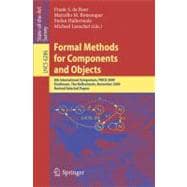
| The BIONETS Project | |
| A Framework for Reasoning on Component Composition | p. 1 |
| The COMPAS Project | |
| Verification of Context-Dependent Channel-Based Service Models | p. 21 |
| The CREDO Project | |
| The Credo Methodology (Extended Version) | p. 41 |
| The DEPLOY Project | |
| Guided Formal Development: Patterns for Modelling and Refinement | p. 70 |
| Applying Event-B Atomicity Decomposition to a Multi Media Protocol | p. 89 |
| The FM-SOA Working Group | |
| Abstract Certification of Global Non-interference in Rewriting Logic | p. 105 |
| The HATS Project | |
| Interleaving Symbolic Execution and Partial Evaluation | p. 125 |
| The INESS Project | |
| The Use of Model Transformation in the INESS Project | p. 147 |
| Suitability of mCRL2 for Concurrent-System Design: A 2 x 2 Switch Case Study | p. 166 |
| The MOGENTES Project | |
| Mapping UML to Labeled Transition Systems for Test-Case Generation: A Translation via Object-Oriented Action Systems | p. 186 |
| Mutation-Based Test Case Generation for Simulink Models | p. 208 |
| Model-Based Mutation Testing of Hybrid Systems | p. 228 |
| The PROTEST Project | |
| Property-Based Testing - The ProTest Project | p. 250 |
| Incrementally Discovering Testable Specifications from Program Executions | p. 272 |
| The QUASIMODO Project | |
| Methodologies for Specification of Real-Time Systems Using Timed I/O Automata | p. 290 |
| The How and Why of Interactive Markov Chains | p. 311 |
| Author Index | p. 339 |
| Table of Contents provided by Ingram. All Rights Reserved. |
The New copy of this book will include any supplemental materials advertised. Please check the title of the book to determine if it should include any access cards, study guides, lab manuals, CDs, etc.
The Used, Rental and eBook copies of this book are not guaranteed to include any supplemental materials. Typically, only the book itself is included. This is true even if the title states it includes any access cards, study guides, lab manuals, CDs, etc.